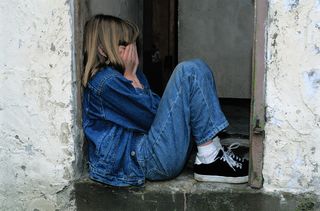Trauma
How Childhood Trauma Makes Us Vulnerable to Abuse
Narcissists pretend to be who we need, yet drain our energy and resources.
Posted May 21, 2019 Reviewed by Ekua Hagan

By Melanie Tonia Evans
Over the years, so many people have asked: "Did my childhood have anything to do with me being narcissistically abused as an adult?"
You may have made the link between a painful childhood and sustaining narcissistic abuse as an adult. Maybe abuse is all you have ever known. Or maybe there was something more subtle going on that made you susceptible to narcissists _ without you even understanding what that could possibly be.
Trauma
Trauma is the inability to deal with a certain stressful situation, which leads to feeling overwhelmed and powerless. In short, it’s not being able to process difficult emotions to completion and then enact the solution. This is when trauma is internalized and has a life of its own inside our brain and nervous systems. It impacts our emotions, our thinking, and often every part of our life.
Please understand the trauma centers and functions of your brain that deal with stresses are in your right-brain section. Trauma is generated within your emotional system and nervous system and therefore is stored in and affects your body.
When we are in tune with our beings, we know how true this is. What I mean by this is that when you receive a trigger relating to an unhealed trauma you feel the "pang" in your body. It may be a heaviness, a feeling of butterflies in your stomach, a shock of "cold ice" through your veins, or you may start sweating and shaking. All sorts of processes start firing off in your body, including the urge to flee, react into defenses (fight), or even shut done where you literally can’t think, answer, or even move (freeze).
These are all right-brain, instinctual functions; survival mechanisms that fire up when wise, clear, and "safe" problem-solving center within your nervous system and brain are not online.
Unresolved Stresses Can Become Traumas
Stresses occur and will always be a part of our everyday life, forever. Whether or not they take us down and out into trauma depends on how we deal with them. A life of CPTSD (complex post-traumatic stress disorder), anxiety, depression, and powerlessness (victimhood) versus continually up-leveling ourselves and situations into more and more opportunity, growth and joy, evolution, and greater interconnectedness with ourselves, life, and others (powerfulness).
The ability to do this depends on how healthily the emotional centers of our right brain and our nervous systems are functioning.
One of the gravest mistakes we can make regarding trying to regulate and manage our trauma is thinking that the answer is cognitive. It isn’t — in fact, our left-brain logical functions can’t communicate with our right brain. They don’t help us process trauma through to completion and they don’t assist in developing these centers to deal with challenges and stresses effectively.
In fact, left-brain interception only invalidates and injures the right-side trauma centers even more, as you will discover later in this post.
The Vital Understanding of What Trauma Does
Trauma is the culprit through and through. If we have received trauma that has impacted us, it not only affects our brain and our entire nervous system, it also creates embedded belief systems that form our inner identity.
These traumatic beliefs become our reality and we can easily remain a victim to them because they become self-fulfilling prophecies that keep us replaying the same traumatic patterns and disappointments over and over again, despite how hard we may try to avoid them.
This is absolutely the case with narcissistic abuse when we find ourselves stuck in a grave and even life-threatening trauma that is tearing us apart. Even though we know it is shocking and extremely bad for us, we can feel powerless to let go.
Trauma does this — we feel like we have no voice or rights and that there is nobody dependable to step in and be the buffer, protect, and help. We feel alone, isolated, and confused. Powerlessness takes over.
In our helplessness with trauma, the shame and guilt of not being able to cope are overwhelming; we don’t believe we are good enough or capable enough or strong enough to have a solution. Often we blame ourselves for the problems and stay connected to the narcissist, trying to fix things or be "better," no matter what is happening to us. We feel defective, damaged, and "wrong."
This is why it’s important to understand what happened in your childhood to set you up for this and how it is not your fault. One of my greatest wishes for this post is to let you know that you are not defective, no matter how much you may feel like you are. What has happened to you is the "normal" consequence of unconscious parenting, which sadly has been a product of parenting in our former generations. No one taught anyone better!
Let’s have a look at what happened to us as children.
How Trauma Occurred as Children
Firstly, I want to start off by being very clear about one very important thing — this episode is in no way about blaming our parents. And I really mean that because no matter what they did and how they behaved, they were also a product of trauma — the way they were parented and the levels of trauma that preceded them in their families.
Once you understand this, you will realise how the feeling and emotional centers of our brain are formed and therefore appreciate the capacity each and every human being, including abusers, has in relation to relating to themselves, life, and others.
Okay, let’s start right from the beginning — disappointments, challenges, and threats begin as a very small child.
These include being hungry and requiring food; hurting oneself or being scared and needing comfort; or feeling physically distressed and requiring restoration such as in the changing of a soiled diaper. Little children are completely codependent on a stable caregiver granting survival necessities as well as emotional comfort when in need.
If we have a present caregiver who models safety and comfort for us, then the parts of our right-brain, which is the first side of our brain to develop when we are little, and our connected nervous systems can start to form healthily.
These are our emotional and social centers responsible for developing our beliefs about ourselves, our place in the world, and other human beings. This healthy development is essential to having a solid and whole core identity.
I want you to understand that the "presence" of a stable caregiver is imperative for the development of our right-brain emotional centers, so as to instill in us the vital ingredients of love, comfort, and safety. This has to be age-appropriate to the child. We have to "feel" the connection somatically in our being for it to be real for us.
Logical action and provisions and purely "adult" reactions do not translate to right-brain communication.
Saying, "Come on, snap out of it!" to a small distressed child is never going to provide the comfort and healing that a heart-to-heart cuddle and soft cooing will. In fact, it is only going to compound the trauma of feeling unsafe and unsupported even more.
To reach and soothe the compromised emotional centers, the input has to be things like caring physical touch and heartfelt words and sounds. Trauma is created from emotional sensory input that registers in the right brain, and the resolution can only come through the physical and emotional senses — the body being an effective way to deliver this.
I have had so many clients and NARP members over the years who, when I talk to them about the necessity to heal core trauma, say to me, "My parents were awesome; they always encouraged me and supported me in everything I wanted to do."
My questions in response to this are: "Did they have time to just be with you, hold you in times of need, look you in the eyes and tell you how much they loved you? Could you confide in your parents and have them hear you and be there for you? Would they listen, allow you to be you, and let you know how special you are?"
Yes, of course, children need boundaries, to learn limits and how to handle disappointment, and to experience cause and effect (personal responsibility), but unless they know they are loved and valued for who they are, then the emotional centers responsible for self-worth, self-love, self-value and resilience to challenges are seriously compromised.
I know your parents may have been terribly busy in survival mode, most of ours were, either practically or trying to deal with their own trauma. Could they be right-brain present with us so that our own right brain could develop properly?
Probably not.
Now, here’s the thing — right brain and nervous system centers begin forming when we are a fetus in utero. It is now scientifically proven that the mother’s emotional state and her ability to regulate her own emotions is a big contributor to how a child’s right brain centers start developing. If she is stressed without her own resources to integrate these stresses to completion, this directly compromises the child’s right-brain formation.
But the plot thickens, because the scientific study of epigenetics now tells us that the ability of certain genes to switch on or off is inherited. If we have come from ancestors who suffered trauma, then the parts of our right brain that could handle stress effectively for us may be shut down from birth. We may have over-formed, hyper-aroused centers and amygdala, meaning rather than anchoring into our core identity to deal with stresses (which is the center for our personal power), we will dissociate from our own being, look outwards, and get hooked into trying to control the uncontrollable (which is anything and anyone that is not us).
All of this brings in increased fractures within and without our lives — meaning more trauma and more traumatic events.
How Disassociation in Childhood Leads to Ongoing Trauma
If we didn’t have a functioning developed core identity (dependent on the right brain and nervous system health), then we were carrying trauma after trauma because we had a limited ability to integrate stresses to completion.
The biggest traumas to have impacted us as children were not the disappointments, frights, lack of safety, or discomfort that we experienced. They were the traumas we experienced because a safe, functional caretaker did not show up to help us integrate these things back to calm and safety.
As children, we simply did not have the developed inner resource centers to do this for ourselves, and therefore it became too traumatizing to be ourselves, alone with these unresolved feelings inside of us. It was far too overwhelming. Then shame and guilt joined in, as well as self-blame for having painful emotions and possibly for causing angst or disruption to our parents for expressing them.
We learned it was wrong to feel. We disengaged from our bodies and from our emotions to survive. We checked out and zoned out — we self-medicated our feelings away with fantasy, distractions, and even addictive and self-compulsive behaviors.
As we were growing up, rather than becoming more developed in our right brain, which is our connection and gateway to self, life, others, and our higher power (true source), we became more reliant on our left brain, which is not the master or healer of our right brain.
In fact, the left brain follows the body — it is ruled by the painful and fractured right brain beliefs we have about certain topics. Our left brain will agree with these beliefs and grant us all the excuses and justifications to bring these painful beliefs to fruition.
This is where the traumatic self-fulfilling prophecies that were established in childhood come into play. It’s so important to understand that trauma affects every part of the brain, both left and right.
Let’s say that when we were young, no one was there for us to know in a right-brain way that we were supported and protected. We grew up believing "It’s up to me. No one is there for me." The result is that we will continually connect to people who we co-generate lack of support with — by rejecting any genuine support offered and trying fruitlessly to get it from people who are unavailable to give it.
Then we say, ‘See I’m right!’
Of course, all this is unconscious! Until we wake up and start healing and integrating and coming out of the self-generative trance, we believe that this is happening "to" us rather than through us.
The same goes for the traumatic beliefs about things like, "People who are supposed to love me aren’t interested in me." And even with tons of cognitive therapy and awareness of this, we may still connect with people who are "apparently" recovering workaholics or who have been in therapy for previous adultery. We believe them to be healed, even though they still act out high-risk behaviors. And then we experience "being unimportant and discarded" again.
The fuel to "be" with people and situations who represents ongoing trauma comes from the right-brain, pre-programmed belief systems we established in our childhood which is then supplemented by the elaborate ideas and justifications that our left brain makes up to follow these beliefs — regardless of what we try to think and formulate.
This all happens because we are not healed and integrated or anchored to inner core truths and values in our bodies. We are dissociative. We are not yet safe to "be" in our bodies.
Until we resolve our core trauma through our nervous systems, cells in our body, and our right brain, and are able to be self-partnered in our body, this is the sad reality and the prison that we can be continually stuck in. Understandably, it makes our trauma pile even bigger.
It makes it even harder to "be" with ourselves – present in real-time, in our own being. We disassociate even more — to the point where we may not be able to feel anything except the rushes of our trauma, which are possibly now being triggered off randomly and continually within us.
This is exactly what complex post-traumatic stress disorder is. We may believe it has to do with what has happened to us — however, the truth about this chronic reoccurring and ever-constant unsafe feeling is that we are not home within.
When we aren’t self-partnered, we are not in touch with who we are or what is or isn’t healthy for us. We don’t have access to our true self-power; we are a being without a compass or rudder being tossed around mercilessly by life.
This makes us highly susceptible to narcissists; beings who are highly exploitative, manipulative, and pathological who pretend to be the person we need for us to feel safe and loved while using our disconnection with ourselves to mine our energy, life-force, and resources.
When we awaken, we realize that the answer to all of this is not to try to control, research, and monitor things and people outside of us or to keep believing and fuelling the self-fulfilling prophecies that our emotional centers keep playing out incredibly convincingly. The only remedy comes from waking up to the truth and turning inwards to do the necessary inner work to repair — where it needs to be repaired — at our core.
© 2019 Republished from original with the permission of, Melanie Tonia Evans, narcissistic abuse recovery expert and speaker; founder, Narcissistic Abuse Recovery Program (NARP).




